10% off £25 OR 15% off £35
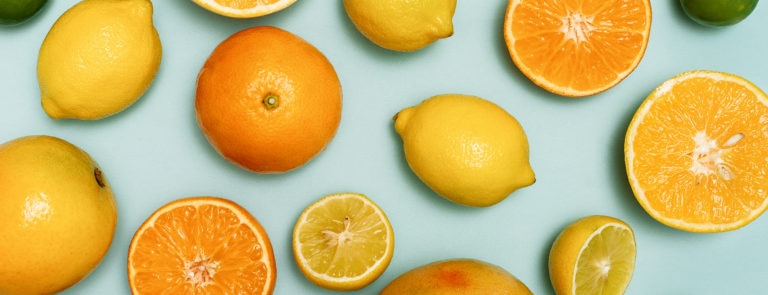
Vitamin C sources: Why we need it
- Health Hub Home
- Vitamins & Supplements
- Vitamins
- Vitamin C
- Vitamin C sources: Why we need it
Everyone knows that oranges are a natural source of vitamin C, but you might not know exactly how this vital vitamin works in our bodies – or if you’re getting enough.
Get the lowdown on this essential nutrient and the best sources of vitamin C, so you can meet yours and your loved ones’ daily nutritional needs.
Skip to:
What is vitamin C?
Also known as ascorbic acid, vitamin C was first identified in the 1930s by Dr Albert Szent-Györgyi. Although it’s hard to imagine now, people would once get very sick or even die due to scurvy (caused by lack of vitamin C ).¹
Luckily, understanding of vitamins has changed, and vitamin C deficiency in the UK is very rare.
However, having low vitamin C levels is not uncommon, especially in people who don’t eat many fruits and vegetables.
Vitamin C has a range of functions, including support for your immune system and maintaining normal skin health.
Vitamin C also helps our bodies absorb iron from plant sources.²
Vitamin C is a water-soluble vitamin. This means our bodies can’t store it, and each time we urinate, we lose a little vitamin C.
Our bodies can’t make it, either. Therefore, we need to make sure we have food or drink containing vitamin C every day to prevent us from running low. The NHS recommends that adults get 40mg of vitamin C per day. ³
Why do we need vitamin C?
1. It supports immunity
1. It supports immunity
According to the NHS, there’s little evidence to suggest that vitamin C can prevent colds or speed up recovery. ³ However, it’s important for supporting our usual immune function in many ways, including: ²
- Helping to keep cells healthy
- Maintaining healthy skin, bones, and cartilage
- Helping with wound healing
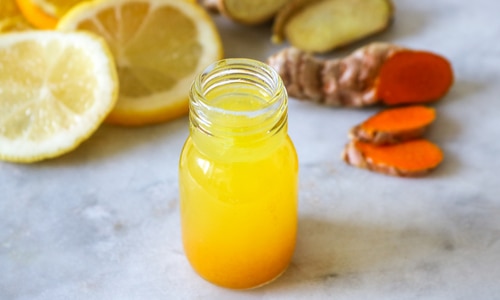

2. It's an antioxidant
Vitamin C is also a powerful antioxidant. It can help protect us from oxidative stress, a type of damage that can affect our cells, proteins, and DNA. ⁴
3. It’s a beauty aid
3. It’s a beauty aid
Looking for a beauty booster? Vitamin C plays an important role in stimulating the production of collagen in our skin, needed to give plumpness and elasticity to skin. ⁵
Lack of vitamin C is also associated with dry skin and brittle hair.
Read more here: What does vitamin C do for the skin?


4. It helps care for your teeth
Scurvy - a disease caused by severe vitamin C deficiency - used to be associated with sailors.
Most people get enough vitamin C through their diet today, and even people who do not eat a balanced diet all the time are not usually considered at risk of scurvy. ⁶
However, scurvy is still present (if not rare) today.
The first sign of scurvy is bleeding gums, as there isn’t enough collagen to help keep gum cells together. This allows the bacteria responsible for gum disease to take hold more easily and could lead to tooth loss.
If you’re concerned you’re severely deficient in vitamin C, speak to your GP who will advise you on the best treatment.
5. It helps absorb iron
5. It helps absorb iron
Going veggie can be a good move, but there are some unique health issues linked to cutting out meat, including not always getting enough iron. A lack of iron can lead to fatigue, anaemia, and a weakened immune system.
The non-heme iron available mostly in plant sources (such as beans, lentils, and dried fruit), is harder for the body to extract from food. So, absorbing your iron well is particularly useful if you follow a vegetarian or vegan diet.
Luckily, vitamin C helps you absorb it more easily. So why not try adding a small, brightly coloured salad to your meals, or having a glass of orange juice with dinner?
Read more: Benefits of vitamin C
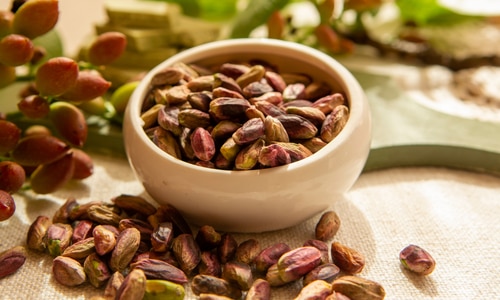

How to ensure you’re getting enough vitamin C
Vitamin C dosage
Adults need a minimum of 40mg of vitamin C a day. ² This is easy to get through a healthy diet with lots of fruit and vegetables.
As with any vitamins, the best way to get vitamin C is through your diet if possible.
Vitamin C deficiency symptoms go away quickly once you start getting vitamin C, whether through diet or supplements.
Dietary vitamin C
To ensure you’re getting enough vitamin C, make sure you eat a wide range of fresh fruits and vegetables.
“Best vitamin C food sources
Some of the best sources of vitamin C are: ⁷
- Red pepper – you may be surprised oranges aren’t first on the list, but red peppers are the best source of vitamin C with 95mg per serving
- Oranges – oranges are still one of the very best foods with vitamin C with one orange packing 70mg per serving. Orange juice is more concentrated so has more – 93mg per serving
- Grapefruit juice – whether you love or hate the bittersweet taste, there’s no denying grapefruit juice contains lots of vitamin C at 70mg per serving. Grapefruits themselves have slightly less, with 39mg per serving
- Kiwi fruit – 1 medium kiwi contains 64mg vitamin C, which provides plenty for your daily needs.
- Broccoli – just a small serving of broccoli contains 51mg vitamin C
- Strawberries – a portion of strawberries comes in at 49mg vitamin C
- Potatoes – one of the more unlikely vitamin C rich foods, there’s around 17mg in a medium baked potato
- Tomato – a medium sized tomato also contains 17mg vitamin C10
Which type of vitamin C supplement is best?
Which type of vitamin C supplement is best?
If you want to take a vitamin C supplement, the choice can be bewildering. You can find them in tablet, capsule, chewable, effervescent, and liquid forms.
Vitamin C is found in a lot of multivitamins, too. Just be sure you’re not “doubling up” as having too much vitamin C could cause side effects.
Check out our guide to the best vitamin C supplements for the family here.
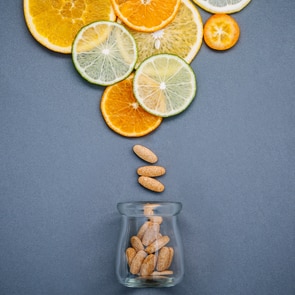

Most vitamin C supplements will come in the following forms:
- Ascorbic acid – vitamin C in its simplest and most common form
- Time-released vitamin C – this releases the vitamin slowly over several hours, providing better absorption and longer-lasting action
- Ester-C® – a more gentler form of vitamin C, ideal for sensitive stomachs
- Bioflavonoids – powerful plant compounds for added immune support
Vitamin C is well-tolerated by the body, and any excess not used is excreted in urine.
However, be careful not to overdo it. People taking too much vitamin C, 1000mg and over, may experience stomach cramps, diarrhoea, and wind. ² These symptoms should disappear once you reduce your dose.
Vitamin C and sunlight
Vitamin C and sunlight
Because you find vitamin C in so many bright, vibrant fruits and vegetables, it’s easy to get it confused with “the sunshine vitamin”.
That’s vitamin D – we get about 90% of our intake from sunlight. ⁸
Unfortunately, sunlight isn’t a source of vitamin C, so you’ll have to reach for the fruit bowl or take a supplement instead.
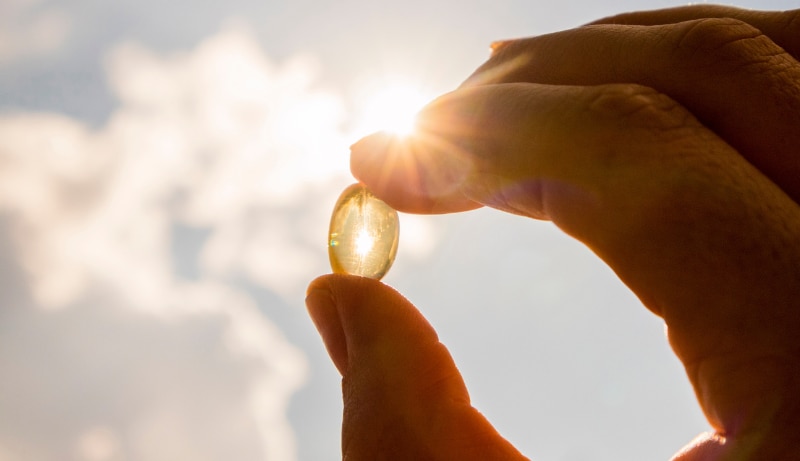

The final say
To summarise:
- Vitamin C is vital for a range of body functions; it benefits our skin, energy levels, bones, immunity, and more
- Our bodies can’t make vitamin C, so we need to get it through our diet every day
- Severe vitamin C deficiency could lead to scurvy
- Most people get what they need from their diet, as fruits and vegetables (including citrus fruits, red pepper, tomatoes, kiwis, and broccoli) are high in vitamin C
- However, you can take a vitamin C supplement if you find getting your intake difficult. The NHS recommends adults get 40mg of vitamin C per day. However, you shouldn’t take any more than 1000mg daily. ²
- Supplements can include different types of vitamin C: ascorbic acid, L-ascorbic acid, “slow release” vitamin C, bioflavonoids, and Ester-C® (which is gentler on the stomach)
- It’s a common misconception that sunlight is a source of vitamin C – that’s vitamin D! •
- Speak to your GP before taking any new supplements, including vitamin C
Last updated: 15 February 2023
1.https://www.acs.org/content/acs/en/education/whatischemistry/landmarks/szentgyorgyi.html
2. https://www.nhs.uk/conditions/vitamins-and-minerals/vitamin-c/
3. https://www.nhs.uk/conditions/common-cold/
4. https://www.ncbi.nlm.nih.gov/pmc/articles/PMC5551541/
5. https://www.ncbi.nlm.nih.gov/pmc/articles/PMC6204628/
6. https://www.nhs.uk/conditions/scurvy/
7. https://ods.od.nih.gov/factsheets/VitaminC-HealthProfessional/
8. https://onlinelibrary.wiley.com/doi/full/10.1111/nbu.12349
The advice in this article is for information only and should not replace medical care. Please check with your GP or healthcare professional before trying any supplements, treatments or remedies. Food supplements must not be used as a substitute for a varied and balanced diet and a healthy lifestyle. Before taking any supplements or minerals, it’s best to make sure you’re getting all the nutrients through your diet first.

Senior Regulatory Affairs Associate
Joined Holland & Barrett: April 2019
Masters Degree in Toxicology and BSc Hons in Medical Biochemistry


